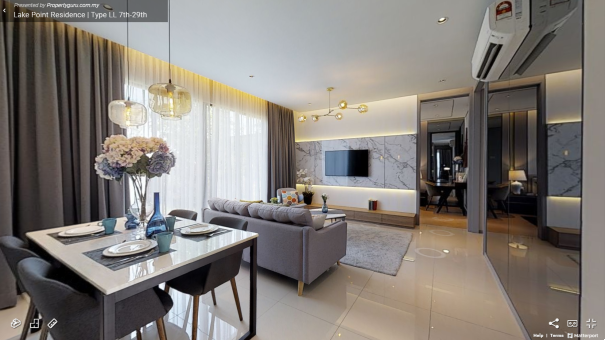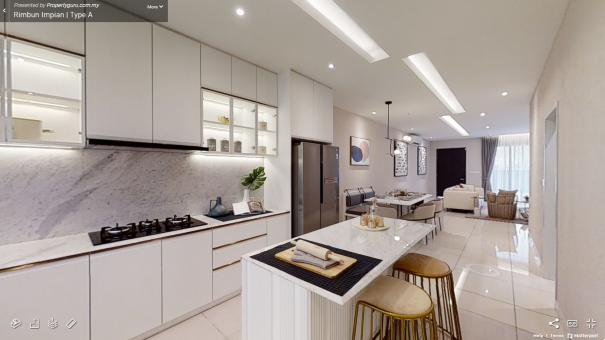If you’re reading this, you might already know that buying a home is probably the heftiest financial commitment you could ever take on in life.
Having to fork out tens of thousands of Ringgit upfront, plus agreeing to repay your home loan every month for the next 30 or so years?
You’re gonna have to make sure that you’re truly ready, and chosen the right property, before you sign that dotted line.
Renting a place to stay can be just as heavy on your wallet, especially if you didn’t check the place thoroughly beforehand, and suddenly discover that there are major repairs or replacements needed after you move in.
But with the COVID-19 pandemic hitting hard, and the subsequent Movement Control Order (MCO) in place, how would you be able to determine if the property you see on your screen would be a worthwhile purchase, or the worst financial decision of your life?
Enter virtual property tours, designed to give you a 360° viewing of both the exterior and interiors! Cast aside your doubts, we’re about to give you tips on how to go about utilising this cutting-edge technology, and the benefits of it.
Tip #1: Request for your agent to show his/her face
Image source: Lake Point Residence, Cyberjaya (Condominium)
You know how there’s a saying, “Never judge a book by its cover”? Well, in this sort of situation, you might need to do a bit of that.
Request that your chosen agent gets on a video call with you, when it comes time to give a running commentary or answer any questions during your walk through.
Remember to trust your gut feeling, especially if you notice that there’s something questionable in his/her voice, behaviour, and mannerisms.
For rentals, it would be good if the landlord were to join the video call as well, since both the tenant and landlord can then assess one another. Would both parties get along fine, or is there already some friction due to differing personalities, from the get-go?
In addition, ask the seller/landlord about what’s included with the property, and what isn’t. Most of the time, furniture and fittings are there just to beautify the interiors, and that’s it. Better to clarify right away, than to be shocked by an empty unit later on!
Tip #2: Make sure you have a trusted professional on your side
Image source: Rimbun Impian, Seremban (Terraced House)
Speaking of chosen agent: A certified real estate agent would not only be able to introduce a range of properties that closely fit your needs and budget, he/she would also be able to dish out advice after every viewing.
Best of all, an agent who has experience in the property industry is a valuable asset to have – he/she can guide you through the entire process, as they’ve honed their skills, and sharpened their instincts.
If something seems off during the virtual tour, like certain parts of the floor plan aren’t included in the viewing, they won’t be able to be fooled that easily!
Tip #3: Be aware of the common tricks in the book
Have you ever seen something so wonderfully breathtaking on your screen, only to be badly disappointed later on when you view it in real life (yes, this applies to people as well)?
Image source: The Estate, Bangsar South (Condominium)
Similarly, when it comes to talking that virtual walk through a property, it’s important to bear in mind that a wide-angle camera is usually used, which make the interiors appear larger than they really are. That’s why you’d need to ask for the built-up size or floor plan for a clearer picture.
If you’re satisfied with the virtual home tour and want to know more, get your agent to set up a video call with the current seller/landlord, as well as his/her agent.
Choose a time where you’re most likely to be at home, which will give you a better idea of the surroundings (i.e. whether the neighbours are noisy, or the sounds of traffic are particularly loud).
Finally, many people may have the misconception that the orientation of the property is only important in Feng Shui, but that couldn’t be further from the truth (although, yes, you may improve your luck in romance, career, family, and health with the correct direction)!
The description may say that the property is facing South, with lots of gentle sunlight. What you may actually be getting though, is an orientation more towards the West, where you’ll be blasted with the full rays of the setting sun. Gonna get a tad bit hot now, people.
Tip #4: Do your best to spot any faults, and ask lots of questions!
Image source: The Marin, Batu Ferringhi (Condominium)
A large crack in the uppermost corner of the ceiling may indicate more serious problems like a burst pipe somewhere. But did you know that virtual-rendered viewings can be touched up to hide these flaws?
You’d better start becoming suspicious if the seller/landlord and their agent happily tells you that there’s absolutely nothing wrong with the property, and all is “perfect”. There’s no such thing.
A professional and ethical agent would actually be able to highlight a few problems or annoyances with the property, if you ask for it; some would even go so far as to willingly volunteer the information.
Once you’re aware of these faults, request for the relevant photos too, so that you’re able to make an informed decision.
Tip #5: Make use of every available online resource
Image source: Meridin Executive Suites, Johor Bahru (SoFo)
Don’t just depend solely on the virtual home walkthrough to give you a complete and unbiased perspective.
Technology has come a long way, giving you many tools right at your fingertips to help you thoroughly evaluate the property and its surroundings.
From Google Street View, to PropertyGuru’s curated pages like AreaInsider, Project Reviews, handy Guides, and comprehensive property market data, you’re not alone on your unique virtual journey to home ownership!
What are the benefits of a virtual property tour?
Still not sold on the idea that you can indeed buy or rent a home successfully with this technology? Here are some of the more obvious benefits to consider:
Image source: Bayu Damansara @ PJU10, Kuala Lumpur (Semi-D)
- Save time – Say goodbye to having to struggle in setting up meetings with the seller/landlord. What’s even more difficult is if one party needs to reschedule if an emergency pops up.
- Cut costs – You no longer need to travel all over Klang Valley to view properties, therefore saving money from the long distances, petrol consumption (especially in traffic jams!), and tolls.
- Freedom – Navigate through the property at your heart’s content, leisurely looking around and daydreaming. Because, the more you spend time with something, the more attractive it gets!
- Accessible – Virtual tours allow you to “walk in” to the property via any device at any day, and any time, no questions asked (no strict security guards too).
- Straightforward – Key information can be presented on screen via an interactive display, allowing you to read and take notes as you slowly make your way through.
- Convenient – Share the links to your top 3 properties with your friends and family, and instantly get their opinions and advice.
You also don’t have to compete with other potential buyers for the property agent’s attention during a conventional open house viewing.Besides, you get to skip stressful situations if the property is small and becomes crowded; imagine the noise and heat (body odour anyone?)!
Looking for the best place to call home but haven’t found something to your liking yet? Check out our extensive listings and hopefully one catches your eye!
Keep Track of New Launches
Visit our new launches page to find the new launch project of your dreams and submit an enquiry today.

Disclaimer: The information is provided for general information only. PropertyGuru International (Malaysia) Sdn Bhd makes no representations or warranties in relation to the information, including but not limited to any representation or warranty as to the fitness for any particular purpose of the information to the fullest extent permitted by law. While every effort has been made to ensure that the information provided in this article is accurate, reliable, and complete as of the time of writing, the information provided in this article should not be relied upon to make any financial, investment, real estate or legal decisions. Additionally, the information should not substitute advice from a trained professional who can take into account your personal facts and circumstances, and we accept no liability if you use the information to form decisions.











